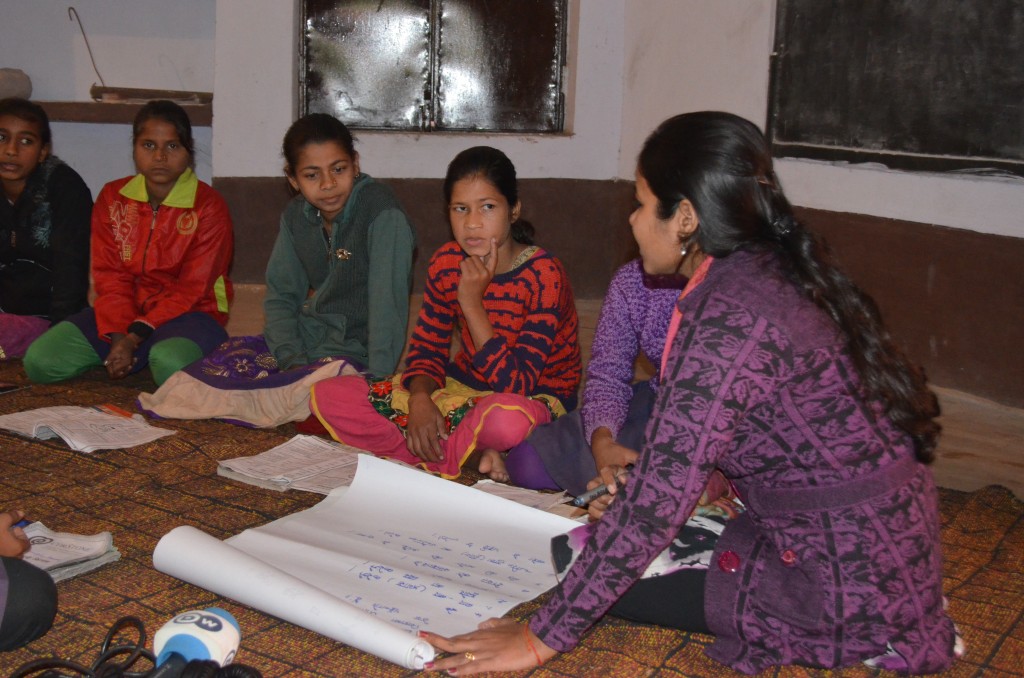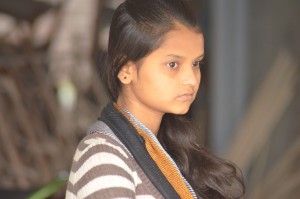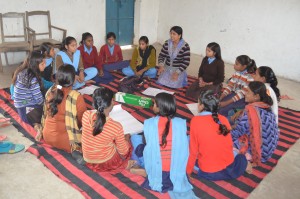Empowering Girls (II)
Child marriage, considered a human rights violation, is a prevalent phenomenon in India that many activists have been fighting against for decades. A report by the ICRW states that the prevalence of child marriage is 60 percent in the state of Bihar, the highest in the country.
I guess it is important to empower girls by giving them information and knowledge about themselves in terms of sexual and reproductive health and the environment; by providing education and livelihood opportunities; by building family and community support; and by promoting an equitable relationship between men and women.
While it is the parents who decide to marry the girls off, organizers are concentrating on adolescent girls for now, mostly in rural pockets of the state so that they can advocate for their rights.
They believe change should begin with the girls and this is the primary focus.
Kumkum Kumari, an instructor, has been teaching girls for over a year and says she sees change in them as they become more confident.
“What this program has taught girls is that they are no less capable….that they are as strong as boys. This has taught them to surge ahead and think of goals. The lessons they learn from here have influenced their parents, many who are illiterate.”
The girls growing confidence, laughter, and joy in learning makes Gracy Andrew proud.
She’s the director of the India chapter of the NGO CorStone who has been running this program in Bihar’s six districts for over two years.
“Bihar is one of the states where you find early marriage which is a big problem. Girls dropping out of schools, a lot of problems with adolescent girls in the state… in most families in Bihar, girls are discriminated and there is a lot of gender discrimination”, she says.
“But at the same time the government is putting efforts to give them a lot of opportunities. There is transition happening in the state.”
Results from a first-of-its-kind randomized controlled trial or RCT of Girls First in 2013-14, involving 3.500 girls and 74 community women facilitators in 76 schools in rural Bihar, demonstrated significant positive impact on mental and physical health, school performance and engagement, self-advocacy, social skills and relationships.
The RCT was conducted in partnership with the Bihar Education Project Council and David & Lucile Packard Foundation.
In another school in Beta, about 40 kilometers from Bihar’s state capital Patna, a round- table session is in progress. About 20 girls have gathered to talk of conquering their fears when accosting hostile boys or having to encounter a drunken father.
Many adolescent girls have stories about how to handle with a boy who is hostile.
I listen to Madhulika Mani, an instructor associated with the program and she is positive.
“Their listening power has increased. The way of talking… and now they talk assertively. And they resolve their problems in their peer support groups. Now, they are in a friendly environment and they are creating the same for others also. They are able to talk to boys!”
I realize after spending days with the girls that they have the power to change their parents’ behavior as well. Upon completing the program, many parents said that their children gave them a more positive outlook on the future.
Clearly, children were proving to be agents of change.
Steve Levental, the executive director oversees the program.
“The most important thing in this work is to start with where you are, not where you wish you were”, he says
In some cases the baseline may be kind of low, considering what hopes or aspirations are. But what is exciting is to see the impact with girls really quickly. Maybe the take away is that it is not difficult to make a change
Author: Murali Krishnan
Editor: Marjory Linardy
_____
WTO RECOMMENDS
The impact of #Selfiewithdaughter campaign
For the first time, India’s Prime Minister Narendra Modi utilized his social media presence and fan following to bring about awareness on the delicate subject of female feticide in the country. (From July 14, 2015)
To be or not to be India’s Daughter?
On the occasion of International Women’s Day, NDTV, India’s largest English news channel, was due to broadcast British filmmaker Leslee Udwin’s documentary India’s Daughter. The film is based on the brutal murder and gangrape of a 23-year-old physiotherapy student, Jyoti Singh also known as Nirbhaya which means ‘The Fearless One’. (From March 8, 2015)
“Women and girls should never give up fighting for their rights”
A few months ago we have published the story of Dr Habiba Sarabi, who became Afghanistan’s first female provincial governor, appointed by the then President Hamid Karzai in 2005. She governed Bamyan and used this platform to promote the rich cultural heritage of the province. In this one-on-one Dr Sarabi shares her extraordinary journey towards becoming one of the foremost female voices in the Afghan politics right now. (From October 5, 2015)









